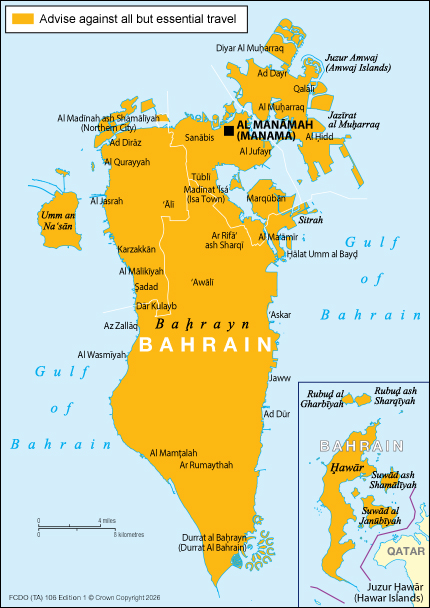Bahrain
Warnings and insurance

Your travel insurance could be invalidated if you travel against advice from the Foreign, Commonwealth & Development Office (FCDO).
FCDO advises against all but essential travel to Bahrain
Find out more about why FCDO advises against travel.
Shelter in place
Due to reported missile attacks, British nationals in Bahrain should immediately shelter in place.
Remain indoors in a secure location, avoid all travel and follow instructions from the local authorities.
Register your presence
Let the UK government know you’re in Bahrain, register your presence if you’re in Bahrain for further updates.
Regional escalation
Regional escalation poses significant security risks and has led to travel disruption.
British nationals should:
-
read If you’re affected by a crisis abroad - GOV.UK. This includes guidance on “how to prepare for a crisis” with suggestions on what you might include in your emergency supplies and “what to do in a crisis”
-
follow advice from the local authorities and sign up to receive information and alerts
-
sign up to FCDO Travel Advice email alerts
-
monitor local and international media for the latest information
-
stay away from areas around security or military facilities
-
keep your departure plans under review, and ensure your travel documents are up to date
-
if you are advised to take shelter, stay indoors or find the nearest safe building or designated shelter. An interior stairwell or a room with as few external walls or windows as possible may provide additional protection
Before you travel
No travel can be guaranteed safe. Read all the advice in this guide. You may also find it helpful to:
- see general advice for women travellers
- read our guide on disability and travel abroad
- see general advice for LGBT+ travellers
- read about safety for solo and independent travel
- see advice on volunteering and adventure travel abroad
Travel insurance
If you choose to travel, research your destinations and get appropriate travel insurance. Insurance should cover your itinerary, planned activities and expenses in an emergency.
About FCDO travel advice
The Foreign, Commonwealth & Development Office (FCDO) provides advice about risks of travel to help you make informed decisions. Find out more about FCDO travel advice.
Get travel advice updates
Sign up to get email notifications when this travel advice is updated.
Follow FCDO: